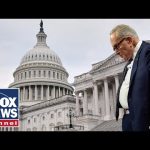The current government shutdown, which began on October 1, 2025, has entered its seventh day with no resolution in sight. At the heart of the stalemate is a $1.5 trillion Democratic spending wishlist, which Republicans argue is laden with unnecessary and non-essential expenditures, including expanded health care benefits for illegal immigrants. Republicans, led by the Republican National Committee Chairman and President Donald Trump, emphasize the need for fiscal responsibility and focus on essential government operations rather than indulging in a liberal agenda that risks the nation’s financial stability.
Democrats, despite historically opposing government shutdowns, appear to have embraced this shutdown as leverage to push back against Republicans and preserve their spending priorities. This strategic shift has drawn criticism for contradicting their previous warnings about the harmful effects of shutdowns on everyday Americans. While the House of Representatives, controlled by Republicans, passed a continuing resolution to fund the government through November 21, this proposal has not garnered enough support in the Senate, largely due to Democratic opposition.
Within the Democratic ranks, divisions are becoming visible, with outspoken figures like Congresswoman Alexandria Ocasio-Cortez seeking to influence negotiations, even as party leadership maintains a cautious approach. Republicans highlight this internal discord and hold the Democrats responsible for the impasse, pointing to the real-world impact on programs from disaster relief to veteran support, programs critical to millions of Americans.
The shutdown’s effects ripple beyond Washington, with states like North Carolina watching closely. The political makeup there—balanced among Republicans, Democrats, and unaffiliated voters—makes effective governance a key electoral issue. The state’s Democratic governor has faced criticism for aligning with national party policies rather than seeking bipartisan solutions, potentially risking voter backlash in the upcoming elections.
Ultimately, the ongoing shutdown serves as a stark reminder of Congress’s failure to prioritize the American people’s needs over partisan agendas. Essential services are disrupted, hundreds of thousands of federal workers face unpaid furloughs, and public trust in government frays. The imperative is clear: both parties need to come together, abandon costly wishlists, and focus on workable solutions that ensure government functionality and fiscal responsibility. The American people, particularly in politically balanced states like North Carolina, expect no less than genuine leadership and cooperation in these trying times.




